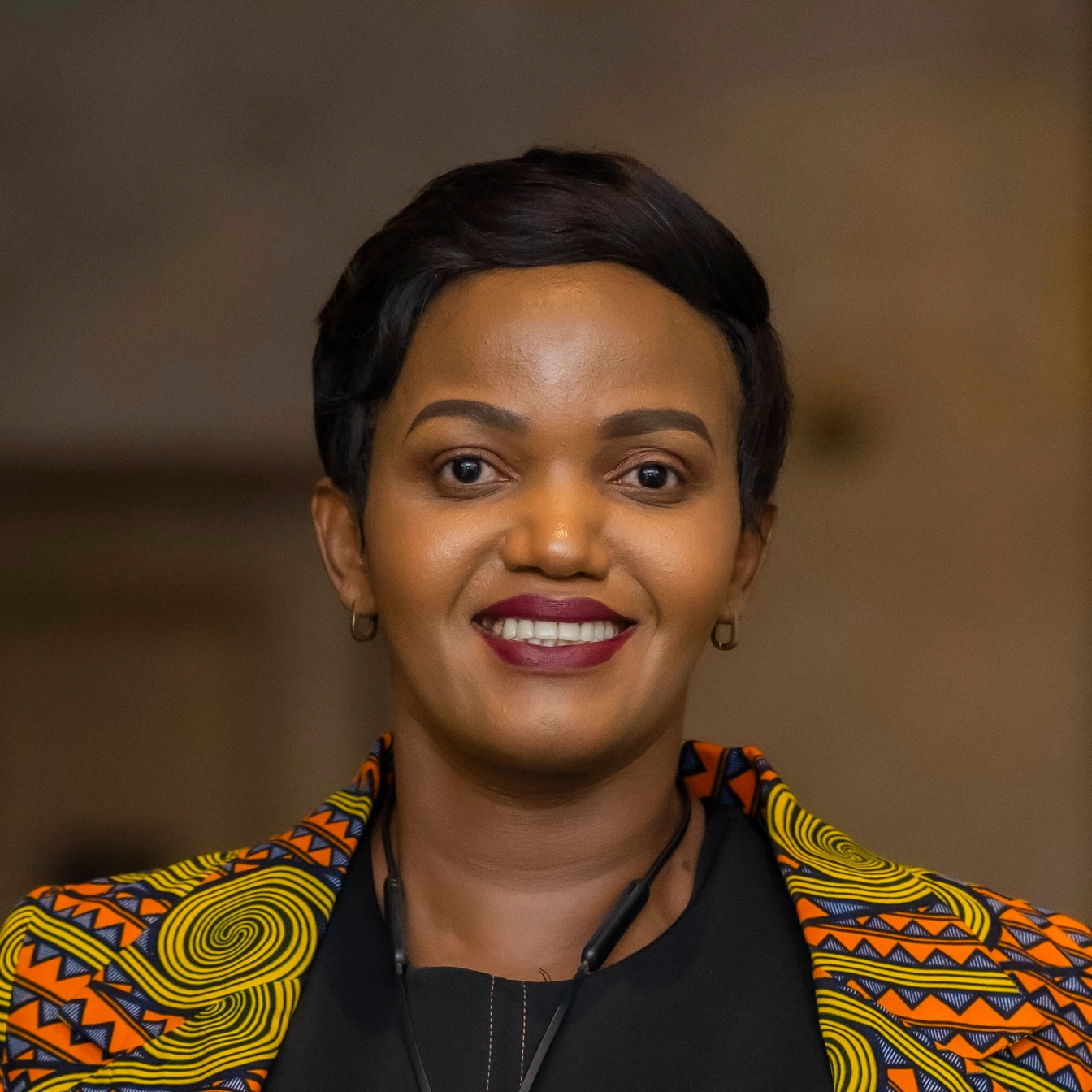Made in Africa: An African Perspective to the Design, Deployment and Governance of AI
The Nigerian Naira plunged 31% against the dollar , and the Kenyan Shilling lost 23% of its value in the past few months. These top two worst performers in Africa in 2024 are the continent's top two technology powerhouses. Therefore, while currency depreciation has had microeconomic implications, it highlights the dire need to take a critical look at Africa's innovation, technology, and AI ecosystem. Ory Okolloh, a prominent Technologist, Kenyan Investor and Philanthropist, posted this on her LinkedIn:
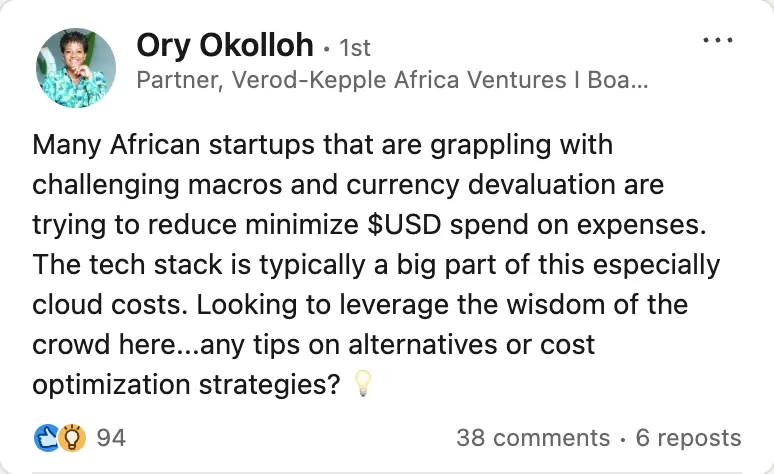
Her post represents the broader issue of access to computing in today's world and raises the question of digital sovereignty, a catchphrase used in the push for digital regulations.
In the first of a six-part paper, we have developed a framework through which we will contribute to Africans' discussions and perspectives on the design, development, and governance of Artificial Intelligence in Africa. This includes Data and Data Systems, AI Infrastructure, Talent, and Market.
Why an African Perspective?
According to PwC, Artificial Intelligence will unlock USD 15.7 trillion value by 2030. While many countries in the Global North do not have to deal with fluctuating foreign exchange rates while working on these digital revolutions, Africans additionally have to deal with large language models whose data was never trained with their contexts or considerations.
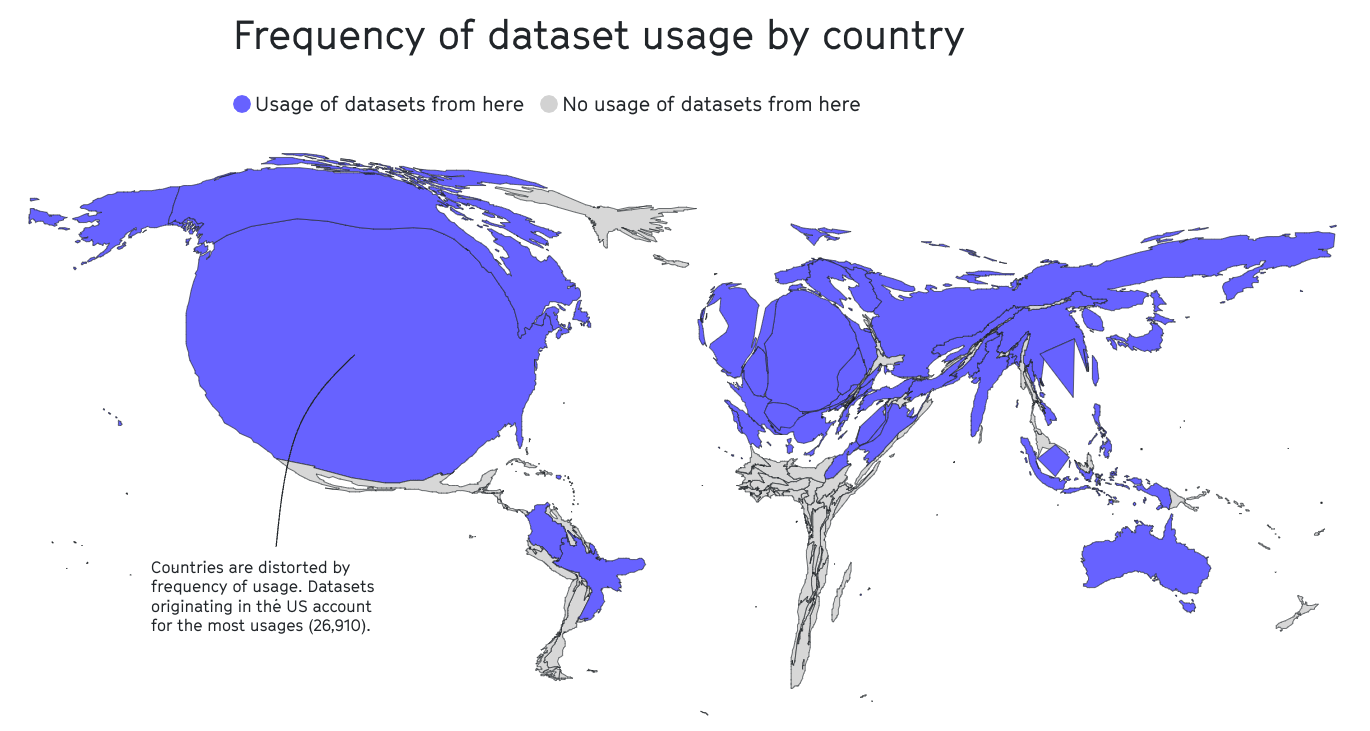
This map shows how often 1,933 datasets were used (43,140 times) for performance benchmarking across 26,535 research papers from 2015 to 2020. Reduced, Reused and Recycled: The Life of a Dataset in Machine Learning Research, Bernard Koch, Emily Denton, Alex Hanna, Jacob G. Foster, 2021. Map made with Natural Earth. Distorted with cartogram 3. Mozilla
An African perspective provides for an indigenous approach to prioritising limited investment and attention in a rapidly changing world. While Western approaches of stiff regulation might influence policymakers on the continent, we are advocating for regulators to take a more holistic approach, first understanding and addressing market gaps to create a thriving ecosystem.
Data Sets and Data Systems
Current datasets lack adequate representation of African languages, accents, and cultural contexts. This has led to controversial issues where AI systems exhibit racial bias. For example when an AI failed to generate an image of a black doctor treating a white child and when another AI wrongly identified a pregnant Black woman as a criminal. Such failures demonstrate biased algorithms.

A researcher typed sentences like "Black African doctors providing care for white suffering children" into an artificial intelligence program designed to generate photo-like images. The goal was to flip the stereotype of the "white saviour" aiding African children. Despite the specifications, the AI program always depicted the children as Black. In 22 of over 350 images, the doctors were white; in some instances, they were animals such as giraffes and rhinos. Midjourney Bot Version 5.1. Annotation by NPR.
This is all due to the lack of diverse training data that limits the ability to develop AI products well-suited for under-represented populations. Real-world performance suffers when systems are not exposed to data reflecting different users. Coordinated efforts to expand African datasets will be crucial for cultivating homegrown AI that respects local contexts and serves all equitably. Expanding data diversity fosters innovation that is both ethically and technologically more robust.
Digital Infrastructure
The computing infrastructure and connectivity used to build and access these AI technologies form another crucial foundation. Yet Africa is severely disadvantaged on both fronts. Data for and about us is hosted and processed outside our jurisdictions, where we have little control over them and even less control over the cost.
The continent houses only 95 data centres out of over 5,000 globally—just 1.8% despite having 17% of the world's population. Internet penetration is 43% compared to 66% globally. Constraints continue, with only one facility on the entire continent ranking among the top 500 most powerful commercially available computer systems.
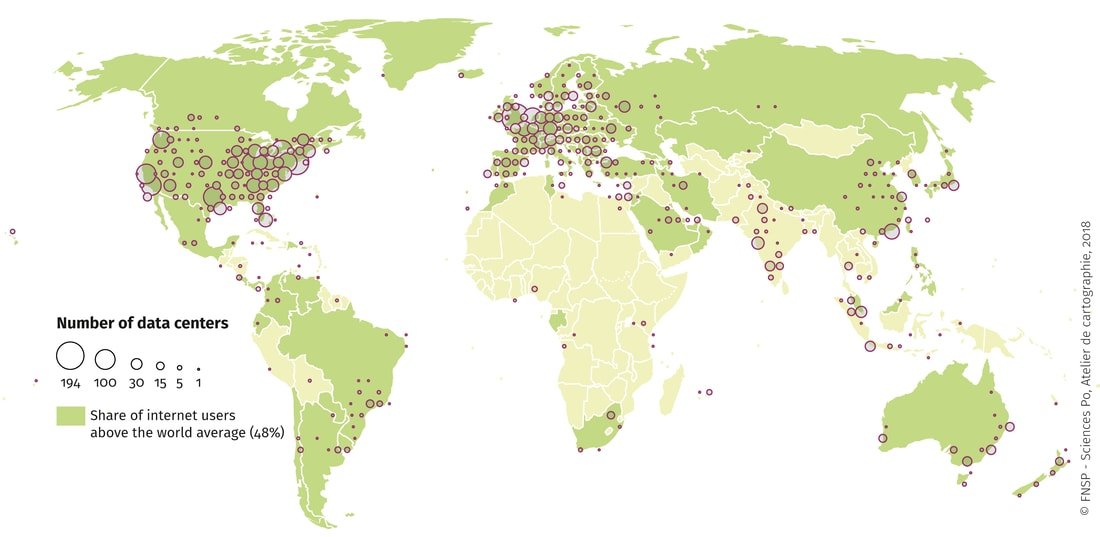
Source: Sciencepro
With such dramatic underinvestment in core infrastructure, African countries risk remaining perpetual consumers rather than innovators in AI's trajectory. A 2019 report by the ITU/UNESCO Broadband Commission for Sustainable Development suggests $100 billion is required to close the internet access gap here by 2030. Therefore, targeted commitments to develop and retain domestic high-performance computing are imperative to unlock Africa's potential. Various nations on the continent have made important strides, and cloud computing zones and centres of excellence have been established. Infrastructure expansion will chart the course for Africa to attain full digital sovereignty amidst the global AI boom rather than playing perpetual catch-up.
Talent
While the demand for AI experts has grown exponentially over the last few years, Africa, except for a few countries, has yet to see an equivalent rise in AI talent. Despite challenges in outdated university curricula, access to relevant data, and investment, pockets of communities and initiatives are building up Africa’s capacity by connecting experts and conducting training, including DeepLearning Indaba, Women in Machine Learning, WanaData, and AI Kenya.
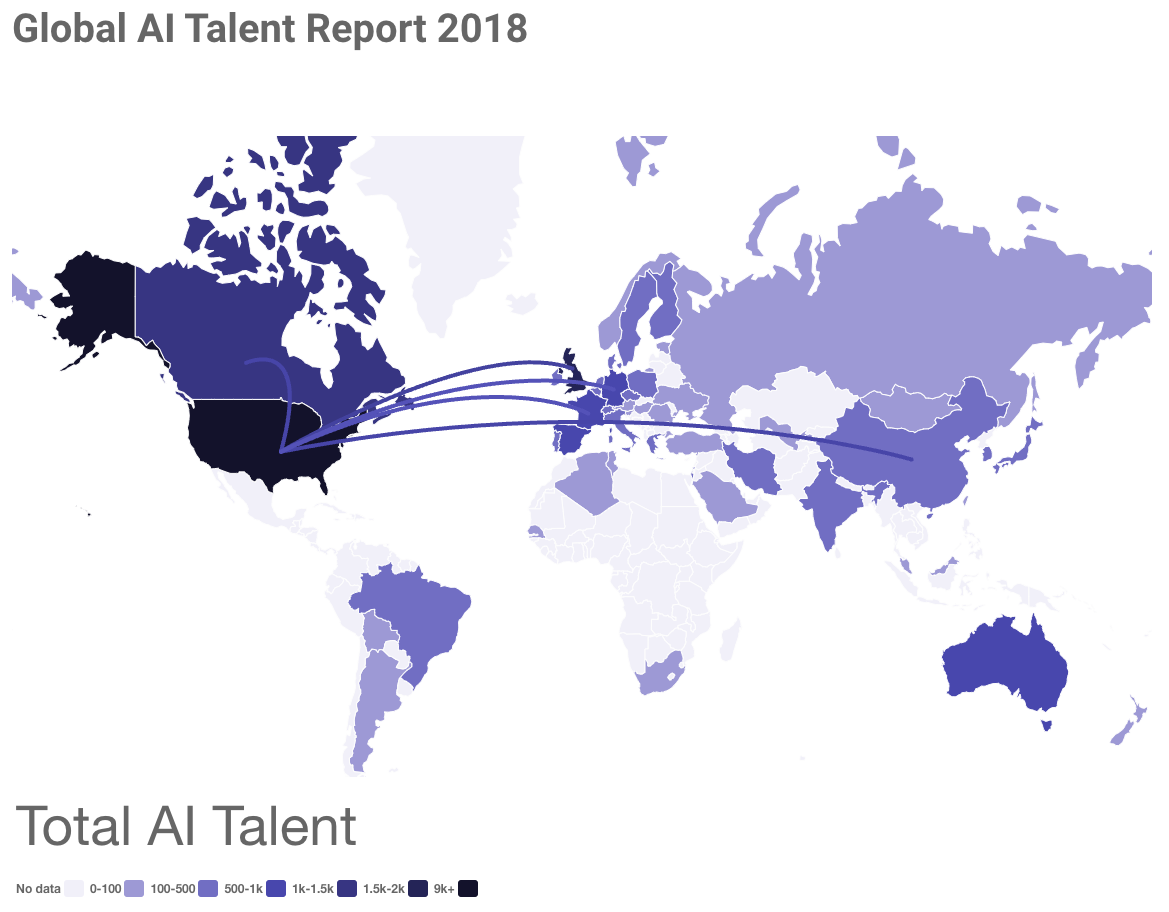
The Global AI Talent Report, 2018. Source
In the World Economic Forum’s “Jobs of Tomorrow: Large Language Models and Jobs” report, they identified three key areas of human resource growth in Artificial Intelligence. These include “trainers” — people developing AI, “explainers” — interface designers for public use of AI, and “sustainers” — make sure AI systems are being used in the best way possible e.g. ethics and governance specialists, content curators, data curators. For example, labelling data for international AI companies in Kenya has become a widespread hustle for young people. Additionally, companies like Voyc AI are transforming customer service beyond Africa.
With the largest youth population in the world coming online and of age (by 2050, more than a third of the world’s young people will live in Africa), there are many opportunities for governments, educators, investors, and companies to build capacity on the continent and harness AI to solve the world’s most pressing challenges while creating economic opportunities for these youth.
Last and most important, applying a gender-lens to AI talent will be crucial to ensure that women are not left behind in the AI revolution. A growing body of evidence shows significant underrepresentation of women and minorities in AI research and industry. For instance, a 2018 AI Index report revealed that a staggering 80% of AI professors at top US universities were men. The gender gap extends to students as well, with only a little over 25% of undergraduate AI students at Stanford and UC Berkeley being women. A more diverse AI workforce can help mitigate bias in AI development, leading to fairer and more equitable outcomes for everyone.
African AI Markets and Use Cases
Awareness is core to building a thriving AI market, but in Africa, a more powerful driver to adoption is and will continue to be that of necessity. For instance, with a 1:5000 doctor-to-patient ratio, a human-aided medical co-pilot accessible in low-end devices becomes more of a necessity than a want.
The key lies in creative frugality and inclusivity—designing solutions optimised for affordability, accessibility, and relevance for all users. Initially targeting niche needs and pain points in sectors like agriculture, health, education, and finance can demonstrate business value.
Africa's vibrant startup ecosystem highlights these prospects with an increasing number of AI-powered start-ups coming up every week. However, African startups attracted $3 billion in VC funding in 2023, while individual AI-focused firms like Anthropic and OpenAI received multiple times that amount.
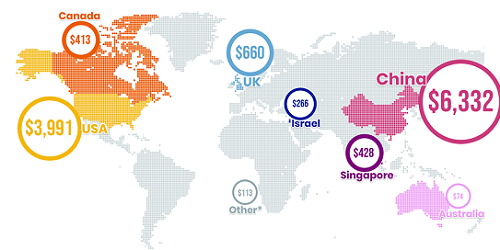
Venture Capital Funding by Country - AI & ML companies with offerings to the commercial smart buildings market total since 2010, in $M per country. 2018. Source
With strategic focus and funding access, African innovation can deliver AI advancements tailored for global south challenges. By moving up the AI value chain, African ventures can capture more direct economic upside rather than ceding control of their human and data assets to non-African interests. The ingredients for profitable and impactful African AI are in place - capital, talent and urgent real-world needs. Impact-driven funding approaches combined with global partnerships can help ignite an AI revolution conceived in and for Africa.
Conclusion
Africa is at a promising inflection point to enter the AI age on its terms. The key is concerted action and investment rather than reactionary policy to guide AI's emergence in empowering rather than extractive ways. Our analysis has resulted in a framework for evaluating Africa's AI readiness. This will support governments and organisations across Africa considering taking full advantage of AI's potential.
Rather than putting the cart before the horse with premature regulation, they should be prioritising collaborative, strategic, targeted investments and partnerships focused on building on-ground operational capacity. This will determine the basis and ability to drive and govern AI innovation rooted in African realities instead of importing this from other geographies.
The starting point is laying a solid foundation and nurturing an ecosystem. This will include encouraging efforts that provide access to computing resources, education programs incorporating African perspectives, and [funding for startups] aligned with the public good of the African people. These can help democratise and shape the AI's ecosystem here. The future remains unwritten, but the decisions made now will chart the course of Africa’s AI trajectory.
Are you interested in contributing to this research?
We are looking for contributors to help us with the next five parts of this research. If you are interested in contributing, please get in touch.

